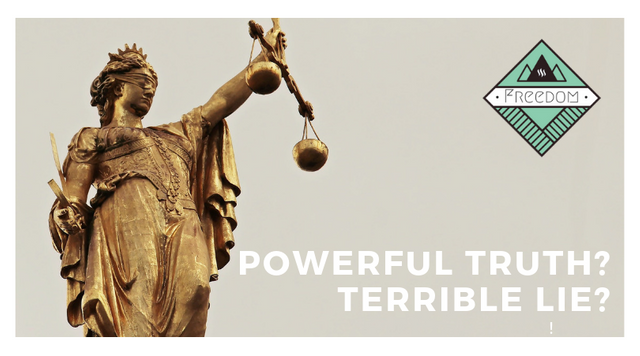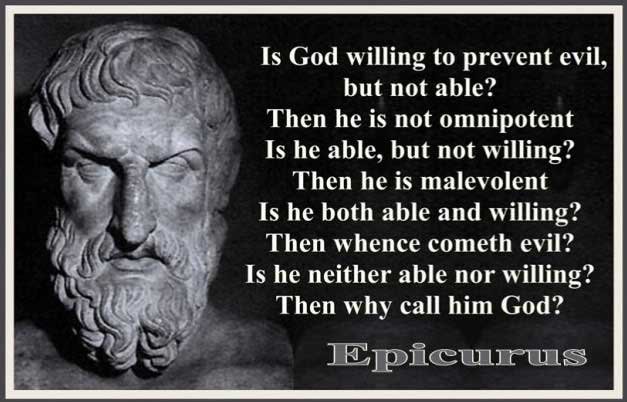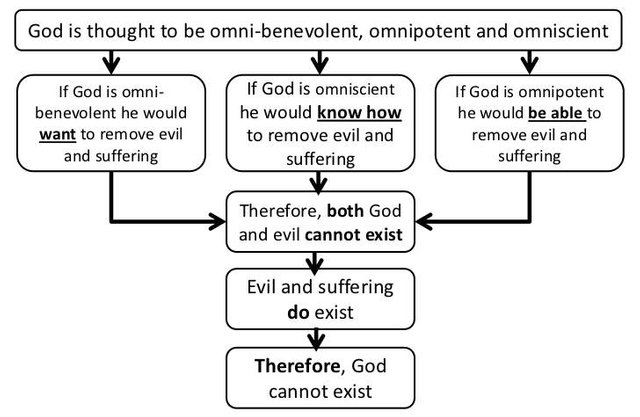Between the existence of good and evil... here's one TRUTH!!
¡Brute Fact!

"Every entity that exists must have an explanation for its existence"
Therefore, our reason always strongly inclines us to think that nothing in this world occurs simply "because", but that rather it must have some sort of 'logical' explanation.
«-The 'Logic' behind this post-»

Yeah! you've guessed it! This is my entry for the @Freedomtribe "Enter The Truth" challenge for which you still have two days to enter before it ends and closes midnight US West Coast time Sunday 21st July.
So, hurry up and click on the previous image to find out what you need to do to have the chance to win some succulent prizes in liquid steem. 

Alright! here we go with mine. :)
Well, first of all. I'm afraid this article is gonna aboard a 'subject' highly controversial that I've attempted to post before. But since it is certainly a subject which I still have not found a way to chop & dissect it in suitable 'small bites' for a better digestion due its natural density to chew them all properly and gulp them down easy...
I suppose this challenge/contest will be a good opportunity to start at least the first chapter of this series. An eventual possible serie. 
Accordingly, I would expect that you'll have the gesture and kindness to click on all the links that I will be releasing throughout this post. All in order to explore in greater depth this subject. Before you dare to start to cackle nonsensically on the comments box about what I have written.
"Although it just be in recognition and gratitude for not having made this article longer than desired. Because to tell the truth, I still harbor some doubts if many here are authentic READERS and above all, genuine fervent and enthusiastic 'curators' of longform wellthought essays"

"God and the existence of evil"

¡Beware Of Faith!
«-The Problem Of Evil-»
"Philosophical Approach"
¿Logical, Inductive or Abductive?
We can classify the formulations of the 'Problem Of Evil' in several large groups or "families" of arguments. The first big classification that must be done, is to distinguish between logical formulations and evidential formulations. Logical formulations insist that the existence of evil is logically incompatible with the existence of God, so that its existence is absolutely impossible.
On the other hand, those who defend an evidential formulation (whether inductive or abductive) believe that the existence of evil and suffering in the world do not make it absolutely impossible for God to exist, but they make their existence improbable. Let's look more closely at each group:
- Logical Formulations:
The logical formulations of the Problem of Evil insist that there is a logical contradiction between the existence of evil and the existence of God. Consequently, since Evil exists in an evident way, for most of these thinkers the existence of God is discarded by the laws of logic so that it is completely impossible for a good God to exist.
One of the first to formulate the problem of evil from this perspective of logical incompatibility, was the famous Greek philosopher Epicurus who expressed himself in the following way:

Later, philosophers have elaborated this idea in a much more rigorous way. A good example is found in the writings of the Australian philosopher John Leslie Mackie, who in his essay "Evil and Omnipotence" argued that it is logically impossible to hold these three propositions together:
- 1.- God is Omnipotent.
- 2.- God is wholly good.
- 3.- Evil exists.

Mackie argues that the faith of the believer forces him to sustain these three propositions simultaneously, but it is only logically possible to only sustain two of them at the same time. In this way, the faith of the believer forces him to hold a belief that is demonstrably irrational and absurd.
The only possible rational alternatives to atheism for Mackie would be, consequently, to believe in an impotent god or worse, in a sadistic god.
Inductive Formulations:
An inductive formulation of the problem of evil consists in saying that the existence of evil or concrete evils diminishes per se the probability that God exists. Just to give an example, consider the next arguments:1.- There are probably "unjustified evils" in the world that are defined as events that produce great evil and:
They do not produce any good that overcomes that evil, or,
They produce a good that, although it is superior to the evil caused, could be obtained by causing a lesser evil.
- 2.- If God exists, then he is morally perfect and has sufficient power and knowledge to prevent any event.
- 3.- A morally perfect being would prevent unjustified evils.
- 4.- Consequently, if God exists, he would prevent unjustified evils.
- 5.= Consequently, if God exists, there would be no unjustified evils.
- 6.- Conclusion: Probably God does not exist!!
William Leonard Rowe, well-known American philosopher, suggests two examples: A sylvan animal which, after being wounded in a forest fire, dies for days alone in the forest before dying and a girl who is tortured, raped and murdered in secret.
Rowe asks: What kind of good can come out of events like these? And, if any good is born of them, was there really no better way to obtain that good? Not even for an omnipotent being?
Rowe does not claim that this is impossible, but it seems unlikely that in the face of the huge number of events that at first sight appear to be unjustified wrongs. An omnipotent and benevolent God can exist. Indeed, Rowe does not "prove" that God does not exist, but places the believer in the uncomfortable position of absolutely have to deny the existence of unjustified evils.
In other words, according to Rowe, the believer actually should commit to believing that each and every one of the bad events that have occurred in our universe have: 1) Produced a good that overcame the evil caused and 2) There was no better way to produce that good.
- Abductive Formulations:
Abductive formulations resemble inductive formulations in that both pose the problem from a probabilistic perspective. However, they differ in that abductive formulations do not consider probabilities in isolation, but in the context of alternative hypotheses.
In effect, the inductive formulations resemble the logical formulations in that they focus on an apparent incompatibility between evil and the existence of God. However, abductive formulas admit the possibility of compatibility, but indicate that this is less likely than an alternative theory.
For example, Paul Draper, another American philosopher, expanding a reasoning found in the writings of David Hume, formulates the problem of evil as a competition between these two incompatible hypotheses:
- Hypothesis 1: The universe is governed by an almighty Being who loves its inhabitants.
And... - Hypothesis 2: The universe is only governed by natural laws indifferent to the suffering of its inhabitants.
Draper concludes that Hypothesis 2 is a much better explanation than Hypothesis 1, so we should believe in it without much resistance.
The abductive arguments are particularly powerful. Because to simply contradict them, it's not enough merely to make the existence of evil compatible with the existence of God, but the believer must argue that the existence of God explains the configuration of the world. Including the existence of evil as a more satisfactory way than an alternative hypothesis.
"The Other Side"

We can classify this type of defensive arguments in three categories:
- Refutations, Defenses and Theodicy:
On the opposite side, as you can imagine, believing thinkers have not resigned themselves to the attacks of atheism, but have devised ways to defend the existence of God in light of the Problem of Evil.
The defenses offered in these environments have been several. And here, I'm gonna present a very brief exposition of those that have been the most influential and most used in apologetic discourses. This with the intention of dedicating to each one a separate entry later.
- Refutations:
By "refutations" I refer here to arguments that totally deny that the existence of evil and suffering reduce, even for a little, the probability that God exists.
Those who use these arguments say that the existence of God is so accurate that no evil, however horrible, diminishes the likelihood of a good, kind, benign and benevolent God.
Some of the most popular arguments that fall into this category are:
- 1.- Skeptic Theism:
"Skeptical Theism" is the belief that human beings are incapable of really knowing if what is apparently bad and lacking in justification really is like that. The defenders of this argument indicate that we must be skeptical of our ability to really know if an evil that apparently lacks justification does not really have some of it.
Many epistemologists maintain that certain truths of the world can not be proved, but it is rational to believe in them because their reality is directly perceived. Some of the things that would fall into this category would be the existence of the outer world outside of our own perception of them and obviously recognize the existence of other minds apart from ours.
Some religious thinkers, notably Alvin Platinga. Maintain that the belief in a kind God would also enter into the list of "non-inferential truths"
For Platinga, humans have a direct perception of God's reality and infinite goodness (except atheists, who for some reason are unable to perceive God directly), which is why no kind of argument against this hypothesis could prosper. Since, no matter how much evil or suffering in the world, it is simply irrelevant to know whether God exists or not.
- Defenses:
By defenses, we understand here arguments that although they admit that the existence of the evil reduces the probability of the existence of God. When the totality of the evidence is taken into account the greater probability that he exists is high.
This type of argument does not directly attack the problem of evil, but seeks to mitigate it using independent proofs of the existence of God. Although evil reduces the likelihood that God exists. Other facts, such as, for example, the existence of miracles, the apparent design of nature, the need for a "first cause" or "necessary entity" etc., raise the probability to such a degree that it is atheism that becomes irrational.
- Theodicies:
However, the most popular defenses that exist against the problem of evil are the so-called "theodicies". As we have seen, the problem of evil disappears if we identify a morally acceptable reason why God will tolerate the existence of evil. The "theodicies" are attempts to precisely offer possible reasons.
We could classify theodicies in three main categories:
- 1.- The Free Will:
The most popular theodicy that exists. For its defenders, human free will is an intrinsic good so great that it overcomes any evil that may come from its misuse.
God, therefore, is fully justified in tolerating the existence of evil caused by human free will, since not doing so would constitute the deprivation of a greater good.
This theodicy is very old and is still popular today, being precisely the aforementioned philosopher Alvin Platinga one of its greatest exponents.
- The Irenaean Theodicy:
Originally proposed in the second century by the Christian leader Irenaeus of Lyons and defended by modern thinkers such as John Hick. This theodicy indicates that the presence of evil and suffering are necessary for the development of human souls.
Irenaeus emphasis on the unity of God is reflected in his corresponding emphasis on the unity of "salvation" history.
Irenaeus repeatedly insists that God began the world and has been overseeing it ever since this creative act. Everything that has happened is part of his plan for humanity. The essence of this plan is a process of maturation: Irenaeus believes that humanity was created immature, and God intended his creatures to take a long time to grow into or assume the divine likeness.
Everything that has happened since has therefore been planned by God to help humanity overcome this initial mishap and achieve spiritual maturity.
The world has been intentionally designed by God as a difficult place, where human beings are forced to make moral decisions, as only in this way can they mature as moral agents. Irenaeus likens death to the big fish that swallowed Jonah: it was only in the depths of the whale's belly that Jonah could turn to God and act according to the divine will. Similarly, death and suffering appear as evils, but without them we could never come to know God.
So, seems like they tend to affirm, that only if evil exists, then can virtues such as courage, temperance and compassion be developed. Consequently, God is justified in allowing the existence of evil since it enables the existence of a higher good.
- Religious theodicies:
Within this category are framed the justifications of evil inherent in traditional monotheistic theologies.
According to Christian theology, for example, evil exists as a consequence of the Original Sin committed by Adam and Eve. However, the effects of this sin will be erased once the world will be redeemed by Christ at the end of the times.
Two stage directions should be made to this type of theodicy. The first is that they usually tend to rely on other theodicies to complement and complete themselves fully in a more substantial and coherent way.
Several theologians, for example, indicate that God was justified in allowing Adam's sin out of respect for his free will, tacitly incorporating that theodicy within the biblical narrative. Secondly, this type of theodicy can only work if the religious narrative has a certain historical reality and not purely metaphorical. Returning to the Christian example, it is difficult to see how the story of Adam and Eve can explain the presence of evil and suffering in the world if Adam and Eve were not historical figures.

¿A Powerful Truth? «or» A Terrible Lie?

So, my dear ¿readers?
The existence of evil and suffering in this world justifies the existence of an always omniscient, omnipotent and benevolent God or not?
I think I'll leave that incognita only to you alone. To solve it by yourselves. Especially if this has given you enough curiosity to dig deeper on the subject and want to abound in more details through the links that I have already left throughout this article.
What I do know though. Is the fact that this indeed has been a terrible lie. When I said somewhere above, that this would be a not so long post. And just a 'small bite' easy to chew, gulp and digest.
But what can I tell you man? I can not help it! And whenever it comes to issues to make you think fiery and deeper in what surrounds you all the time and everywhere in your daily life. I have to take advantage of it.
I only hope that this 'terrible little white lie' has served at least to sting your will and curiosity to explore further beyond of your comfortable bubble of regular convictions & usual echo chambers. And in its rebound, I also hope to please the delicate and exquisite palate of the chaps and curators of @Freedomtribe, @Tribesteemup, @richardcrill and @nainaztengra to appreciate my entry in their challenge/contest as this deserves it. };)

Many ascribe the creator human qualities. Hypothetically, if the creator is everything knowable and unknowable to us, it cannot be good or evil. It just is. If the creator were inclined toward what we call 'good', what we call 'evil' must exist in order that we do our best to remove it from our ways of thinking, or in other words... what we call our 'spirit'. Much as, in order to forge steel... Impurities must be removed. Just a thought.
Wow, that's a very deep reading. Honestly I will need to read it a couple of times more to thoroughly get the message. But as far as my logic goes. I believe yes there is a creator who has created whole of this Universe, again here if you go with Stephen Hawking's theory it is all Science but just that we humans are so used to making someone responsible for something we have come up with the concept of God. Coming back to my logic, so God created the Universe, but then after that the Good and the Evil whatever is happening is based on the energy we keep spreading out through our actions, thoughts and words. It's a vicious cycle of cause and effect. What surrounds us is what is within us. If we are gripped in fear that is what will keep coming back to us, and if we are in the frequency of love that is what will keep coming back to us. So all that matters to me is at what frequency do I vibrate.
Thank you for taking time out to give us this wonderful post.
THANK YOU for entering @freedomtribe's TRUTH challenge.
Aaaahhh - the Problem of Evil. I remember spending a whole semester o this in first year university Philosophy. :) Resteemed.
Good luck with your entry!!
If you haven't already delegated to @freedomtribe, please consider joining us and receiving regular support for content around our 5 curated tags of #freedom #truth #life #love #happiness
Join us on the Freedom Tribe Discord to learn more!
Very interesting problem you're addressing! Except for, I never actually saw this as a "problem" myself. Personally, I guess I'm closest to the skeptic theistic view, meaning that with our limited views and understanding are incapable of knowing the real meanings of good and evil.
Of course, that is much too simplified, since I would say that it's really not that hard opening up our minds to understand the goodness in alleged evils. In order to appreciate a simple meal you would need to have felt hunger. In other words, the alleged good loses its quality without the corresponding evil. No need to have a divine understanding for that.
At this point, I should probably also point out that my personal understanding of God is also different from the mainstream. Is there such a thing as auto-theism, meaning being my own God? I mean, since I've never been outside of my own mind, there is no reason why I should believe in a world that's not entirely my own perception. In other words, the world was created by me, in the instant I perceived it. Though I realize that by saying this, I'm essentially stepping on everyone's toes, not to mention that this takes us a few steps away from your article. I guess my point was, this entire philosophical discourse is based on premises that are commonly accepted... due to tradition I guess, but outside of them become irrelevant very quickly.